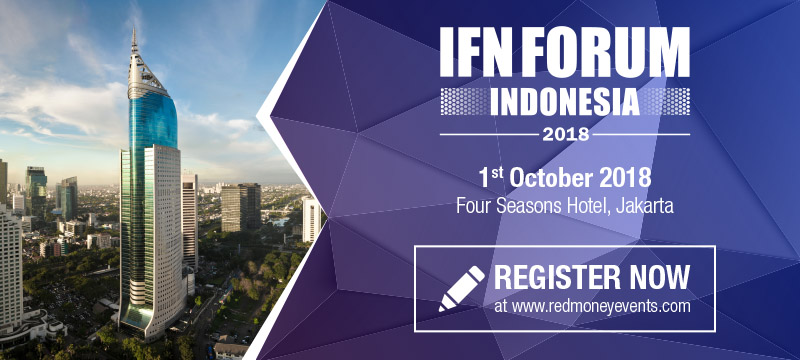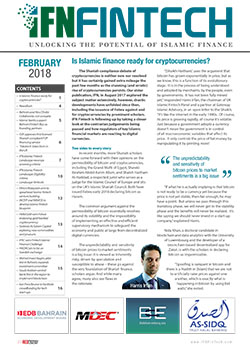In IFN's monthly analysis, we bring you a comprehensive review of global Islamic markets. May saw a sustained level of deal activity, along with a wealth of new products from Islamic banks and an increasing interest in mergers and acquisitions (M&A) between players.
Deals
The results are in for the first quarter, and the UAE led dollar Sukuk issuance with 31.3% of the offerings, according to RAM Ratings. This was followed by Indonesia (28.9%), Malaysia (22.4%), Saudi Arabia (16.9%) and Qatar (0.5%). US dollar Sukuk issuance rose 47.6% to US$10.4 billion, accounting for 34.5% of global Sukuk offerings.
This has been backed up by sustained deal activity across the board – with the most action coming from Malaysia over the month of May. Malaysian corporates including AEON, Telekom Malaysia, Matrix Concepts, Sabah Credit Corporation, Skyworld and Titijaya Land all issued Islamic paper; while Yinson TMC made history with its first-ever perpetual Sukuk Mudarabah. Over in the GCC, Virgin Mobile Middle East and Africa closed a senior secured US$30 million pre-IPO exchangeable Sukuk facility, Noor Bank listed its US$500 million Sukuk on NASDAQ Dubai, Dar Al Arkan completed the repayment of its SAR1.69 billion (US$450.46 million) Sukuk (2018 series 1 medium-term note) due on the 24th May 2018 and the Dana Gas board finally came to an agreement regarding the refinancing of its disputed Sukuk, with a general assembly of shareholders expected to approve the deal on the 21st June.
On the sovereign front, Indonesia floated its usual Sukuk series, Bank Negara Malaysia issued new short-term papers, Kuwait issued Islamic liquidity instruments, the Maldives issued Mudarabah certificates, the Central Bank of Bahrain issued Sukuk Ijarah, Gambia printed Sukuk Salam, Bangladesh Bank sold six-month Islami investment bonds worth BDT1.68 billion (US$19.66 million) and the Saudi Arabian government issued SAR3.95 billion (US$1.05 billion)-worth of Sukuk in three tranches maturing in 2023, 2025 and 2028.
Commercial lending also had a busy month, with a multitude of deals rivaling the Sukuk market in volume and frequency. Notable transactions included a SAR125 million (US$33.11 million) facility from SAMBA Financial Group for Saudi's Pharma Serve, SAR540.5 million (US$144.06 million) in Tawarrruq financing from Arab National Bank for Al Hammadi Development and Investment Company, US$200 million from the African Export-Import Bank (advised by Abu Dhabi Islamic Bank Egypt) for Telecom Egypt and a six-year medium-term revolving credit facility worth QAR911 million (US$248.17 million) from Qatar's Barwa Bank to Vodafone Qatar. In the UAE, DAE Aerospace secured a four-year unsecured revolving credit facility with an initial commitment of US$480 million, arranged by Al Ahli Bank of Kuwait, First Abu Dhabi Bank and Noor Bank – one of the largest transactions of its kind ever in the Emirates. In Oman, Amjaad Group signed an agreement with Al Yusr Islamic Banking for the financing of its new project, the Movenpick Hotel Bausher, while in the UK, the Bank of London and The Middle East extended an GBP18.04 million (US$24.24 million) financing facility to KDM Hurst Street and KDM Tabley Street, headed by Liverpool-based property entrepreneur Ming Yeung of YPG Group of Companies.
Finally, in Indonesia, the Indonesian Stock Exchange launched three new indices including the Jakarta Islamic Index 70, tracking 70 Shariah compliant shares selected from the Indonesia Shariah Shares Index.
Banking
The Islamic banking sector has been busy this month, with a multitude of mergers and a wave of new product launches.
In its latest technological development, HSBC Holdings, which operates HSBC Amanah, launched facial-recognition technology for mobile banking services. The Face ID technology is expected to speed up the log-in process and increase account security. In the UAE, Emirates Islamic launched a series of new services including a comprehensive range of home finance solutions, construction finance and credit cards, while Emirates NBD established a new range of EasyHub digital kiosks in association with Diebold Nixdorf. Bahrain's Ithmaar Bank launched a new eBanking service, while Kuwait's Boubyan Bank pioneered Musaed, an artificial intelligence chatbot available on its mobile app.
On the M&A front, Noor Investment has sold its stake in Meezan Bank, while Standard Chartered's private equity arm is looking to sell off its share of Saudi Binladin Group's Construction Products Holding due to its current restructuring. In Bahrain, Al Ebdaa Bank for Microfinance is planning an expansion, while in Saudi Arabia, Al Hammadi Development and Investment Company has signed an agreement with Arab National Bank to increase and amend its Islamic credit facilities. In Oman, Oman Arab Bank and Alizz Islamic Bank are exploring the possibility of a merger, while in Turkey, Emirates NBD recently acquired DenizBank in its entirety from Russia's SberBank.
Finally, in the UAE, Abu Dhabi Islamic Bank passed the one million customer mark, congratulations to them.
Performance
The Shariah equity markets this month have seen a firm recovery from a poor performance over the past two months. In May, the S&P Global BMI Shariah returned 2.41%, almost triple the returns of the previous month – and a substantially better performance than the conventional index, which returned just 0.3% over the same period.
Asia did less well, with the S&P Pan Asia Shariah falling by 1.08%, only a marginal improvement over the conventional index which lost 1.77%. Africa had an even worse month, with the S&P Pan Africa Shariah Index losing a catastrophic -8.73%, worse than its conventional peer which lost -6.87%.
The Middle East also struggled in May. The S&P Pan Arab Composite Shariah fell by -2.35% over the month, largely comparable to the conventional index at -2.05%, while the GCC Composite Shariah lost -1.75% (compared to -1.68% for the conventional index).
Overall, the S&P Emerging BMI Shariah was fairly flat at 0.8% over the month, while the Frontier Shariah Index struggled even more severely, with a mammoth -8% drop. In comparison, the Developed BMI Shariah gained a modest 2.72%.
The property market continued its slight upwards trajectory, with the S&P Global Property Shariah gaining 0.89% while the Global REIT Shariah did even better with 2.18%. Global infrastructure continued to flounder, losing -2.32% over the month.
Asset management
May was not the busiest month for asset management in the Islamic space, but a few sectors have seen sustained activity as we move into the summer months.
Most notably, Islamic REITs continued their capital-raising push. Saudi's Derayah REIT obtained a SAR600 million (US$159.91 million) Islamic financing facility from Riyadh Bank, which will be utilized to acquire new income-producing real estate assets for the REIT in line with the fund's diversification strategy. The SEDCO Capital REIT Fund obtained a five-year Shariah compliant financing facility worth SAR600 million from Al Rajhi Bank, secured by a mortgage warrant and mortgages. And Riyad Capital successfully closed the secondary public offering to increase the capital of its Shariah compliant Riyad REIT Fund from SAR500 million (US$133.27 million) to SAR1.63 billion (US$434.46 million) with a total of 18,000 subscribers. The REIT is the first fund to carry out a secondary offering by raising its capital through a new mechanism based on a right of allocation method, and plans to use the capital to acquire three new properties in Saudi Arabia.
Over in Indonesia, pioneering crowdfunding platform Blossom Finance launched its first publicly available Islamic microfinance fund, which will see investors receive profit-sharing from Blossom's network of microfinance partners in Central Java. These partners will in turn use the funds for microbusinesses – especially traditional market sellers – to meet the increased demand during the Ramadan holidays. Investors can also invest in a range of cryptocurrency options including bitcoin, bitcoin cash and Ethereum via Blossom's US Delaware-based fund.
Finally, Iran's Tehran University became the latest academic institution to enter the Islamic capital markets, with the launch of Iran's first academic venture capital fund, raising IRR150 billion (US$3.55 million). The vehicle, which is the fifth venture capital fund to be traded on Iran Fara Bourse's third market, will support information and communication technology projects in the country. |















No comments:
Post a Comment
Note: Only a member of this blog may post a comment.